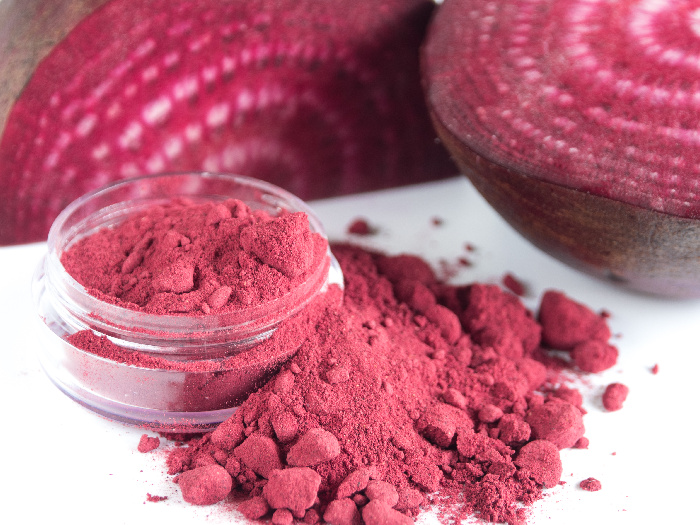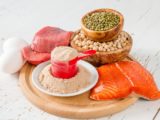Beet juice powder is a clever invention to help athletes get significant performance-boosting results without eating almost two pounds of beets in one sitting! There are two types of beet powders in the market – a powder made from beet juice and the other made from whole beets. Let’s take a look at the benefits of beet juice powder and if it is a better buy for you than beetroot powder.
Beet Juice Powder: A Natural Energy Booster
Beet juice powder is made by juicing whole beets and then dehydrating the beet juice into powder. The powder is sold as a dietary supplement as it contains potent phytonutrients such as naturally occurring nitrates, betaine, and phenols. Fitness enthusiasts like to add juice powder to their pre-workout drinks for an instant energy boost. The powder has a beautiful pink color and is added as an alternative food coloring in red velvet cakes and cupcakes. [1]

Beet juice powder is used as a dietary supplement and an alternative food coloring. Photo Credit: Shutterstock
Organic beet juice powder is widely used by athletes as a performance booster. Beets and beet juice are rich in dietary nitrates, which the body converts into nitric oxides. Research shows that nitric oxide helps increase blood flow, enhance muscle contraction, and improve cardiovascular function. A six-day supplementation of a small, concentrated dose of beet juice to 12 trained male cyclists showed improvement in a 10-km time-trial performance, according to a study published in the International Journal of Sports Nutrition and Exercise Metabolism. [2] [3]
Beet Juice Powder Vs Beetroot Powder
Beet juice powder derived from beet juice differs from beetroot powder, which is made by dehydrating whole beets and then grinding them into a fine powder.
The juice powder has a higher concentration of nitrates than beetroot powder, which makes it ideal for a pre-workout shot or as a stamina booster. On the flip side, it is higher in sugar than its beetroot counterpart as it is made from the juice. Also, the juice powder contains zero fiber whereas 100 grams of beetroot powder (branded) contains 25 grams of fiber as it is made from whole beets. [4]
A round-up of product reviews on the internet shows that many people prefer beetroot juice powder as it has a sweeter flavor than the earthy, almost-gritty taste of beetroot powder. It is easier to drink beetroot juice powder mixed with water or almond milk and a couple of ice cubes. On the other hand, you may need to mask the taste of beetroot powder in smoothies or with other ingredients. Also, beetroot juice powder is usually bright pink is color while beetroot powder has a deep red or maroon color.
Whatever may be your choice, it would be best to get an organic brand as harmful chemicals used on beets could counteract the health benefits of the dietary supplement.
How To Use Beet Juice Powder?
Beetroot juice powder is usually marketed as a raw superfood. Its pink color and naturally sweet taste make it a wonderful flavoring agent, taste enhancer, and food coloring ingredient. Since it is made from 100 percent beet juice, it is a great gluten-free and paleo-friendly option. Here are some innovative ways to use the juice powder:
- Mix with water and ice cubes for a refreshing energy boost.
- It tastes great when sprinkled on yogurt, overnight oats, or chia pudding.
- Try sprinkling it on roasted vegetables to enhance their sweet taste.
- The powder makes for a natural thickening agent for soups, gravies, and soups.
- You can add it to smoothies and juices for taste and nutrition.
- It can help jazz up salad dressings.
- Use it as a natural food colorant.
- You can also combine with other flours while baking bread and cakes.
Word of Caution: Always follow the package instructions on the correct daily dosage for the juice powder. Whenever you eat beets or its products, you may see a pinkish hue in your urine (beeturia) or stools. This is harmless but if you are concerned about it, check with your doctor to rule out any abnormalities. [5]
Beets and beet products are high in oxalates. So if you are prone to oxalate-containing kidney stones, exercise caution while having beets. Similarly, the oxalates could cause a flare-up in gout if you have a history of arthritic pain or if you have gout. [6]

